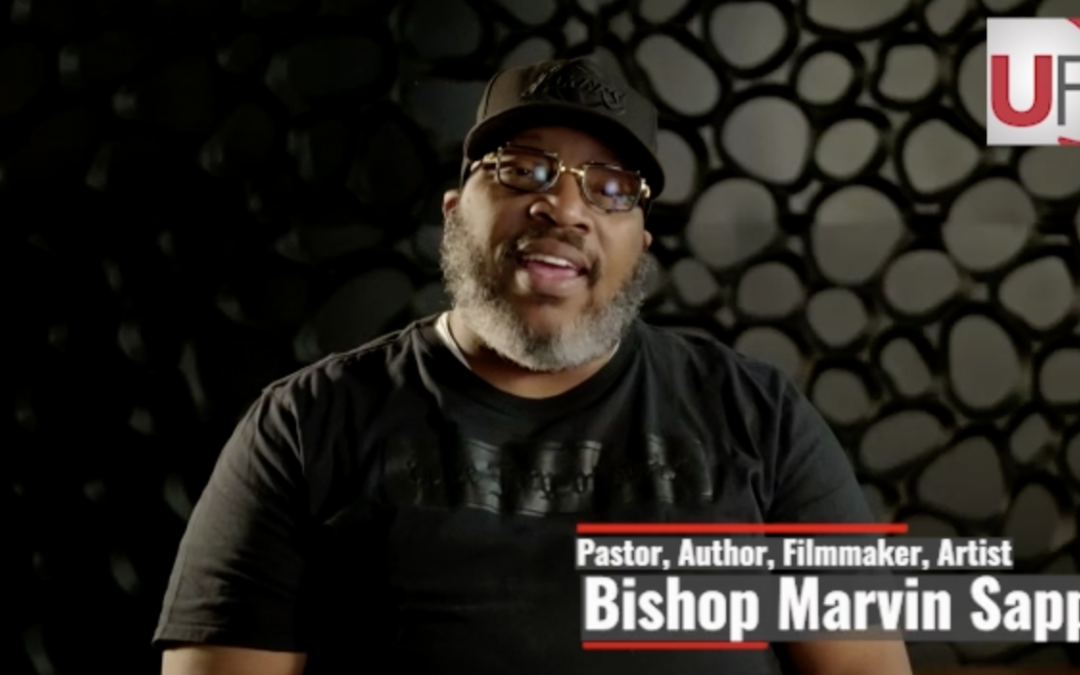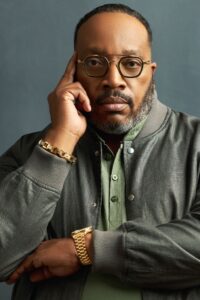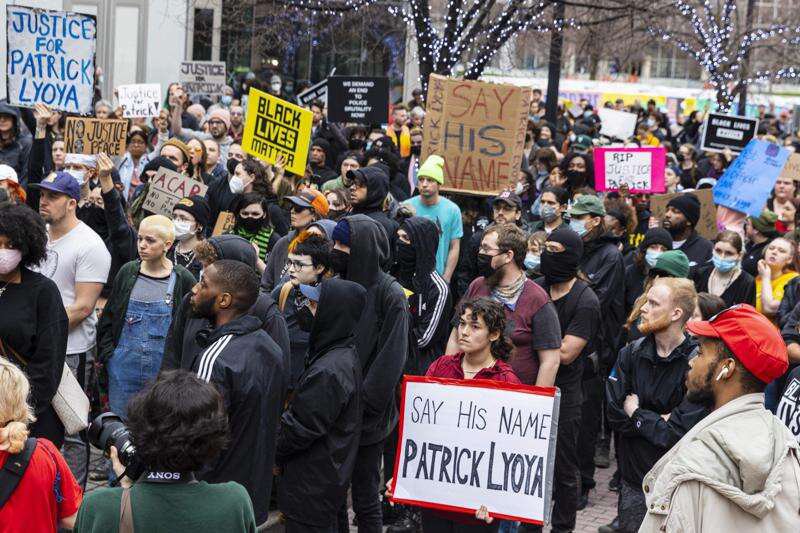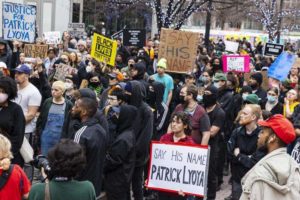
by Maina Mwaura, Urban Faith Contributing Writer | Nov 17, 2022 | Commentary, Entertainment, Headline News |
Bishop Marvin Sapp is a pastor, musician, author, artist and now filmmaker. He’s working on learning how to cook. He has over a dozen Grammy nominations, Stellar Awards, BET Awards and more as a Gospel Artist. He is the co-founder and pastor of two churches in Grand Rapids, MI and Fort Worth, TX. He is the Bishop serving over 100 congregations. He is a gifted preacher, speaker and leader. He most recently released a film with TVOne telling his testimony and was an executive producer and star of the film. To put it lightly, Marvin Sapp is a busy man of God. But it is his love for people, his incredible testimonies, and his heartfelt authenticity that have helped him be a vessel for the Holy Spirit for decades. UrbanFaith sat down with this legendary Gospel artist and minister and talked about everything from film to football and ministry to mental health. The full interview is above, more about Bishop Sapp is below.

Bishop Marvin L. Sapp is a passionate orator and biblical teacher, who desires to be a living epistle glorifying our Lord and Savior Jesus Christ both in word and in deed who is the Co-Founder of Lighthouse Full Life Center Church in Grand Rapids, Michigan and the Senior Pastor of The Chosen Vessel Cathedral in Fort Worth, Texas as well as a Metropolitan Bishop that oversees more than 100 churches in the Central Deanery of Global United Fellowship.
Bishop Sapp is a multiplatinum selling artist who has enjoyed a decorated music career receiving 13 Grammy nominations, 24 Stellar Awards, 2 Soul Train Music Awards, 2 BET Awards, 4 Dove Awards, 8 BMI songwriter’s awards for sales, Black Music Honors Gospel Music Icon Award along with many other accolades and honors from national, regional, and local institutions.

by Kathryn Post, RNS | Apr 21, 2022 | Commentary, Headline News, Social Justice |

(RNS) — Pastors in Grand Rapids, Michigan, are taking action as the city reels in the aftermath of the fatal shooting of 26-year-old Patrick Lyoya by a Grand Rapids police officer on April 4. Video footage of the shooting was released on Wednesday (April 13), sparking protests outside the city’s police department.
Lyoya, who is Black, was pulled over last week for a mismatched license plate. Video footage shows a white officer shooting Lyoya in the head after a brief scuffle. Lyoya and his family arrived from the Democratic Republic of the Congo in 2014 as refugees, and he leaves behind his parents, two young daughters and five siblings.
In the days since Lyoya’s death, a group of Black pastors in Grand Rapids, called the Black Clergy Coalition, has been organizing community events to promote dialogue, healing and justice.
“We think that our faith perspective is critical in this hour, to not just discuss policy change, which is necessary, but to also discuss the spiritual and faith dynamic,” said Pastor Jathan K. Austin of Bethel Empowerment Church in Grand Rapids. “We must continue to keep our trust in the Father so that people don’t lose trust in this time because of the heartache, the pain.”
On Sunday (April 10), the group helped organize a forum for community discussion in response to Lyoya’s death. The discussion took place at Renaissance Church of God in Christ in Grand Rapids — the location was intentional, according to the church’s senior pastor, Bishop Dennis J. McMurray, who noted the wider church’s historic role in guiding civil rights movements and said the Black Clergy Coalition is drawing on that legacy.
“It was unreal, the level of cooperative dialogue and understanding that took place,” McMurray told Religion News Service. “If these conversations would have started almost anywhere else, the volatility that could be associated to something as devastating as what we’re facing could have been a bomb that goes off that would cause so many other issues.”
The group also helped host a Thursday press conference at the Renaissance Church of God in Christ and a noon Good Friday service at the church, where they took up a collection for the Lyoya family.
The Rev. Khary Bridgewater, who lives in Grand Rapids, said the city’s racial and religious landscape informs how local leaders are responding to Lyoya’s death. Grand Rapids has a population that’s over 65% white and about 18% Black. It’s also the headquarters for the Christian Reformed Church, a small, historically Dutch Reformed denomination, and is home to over 40 CRC churches. According to Bridgewater, leaders shaped by the CRC’s reformed theology are often more likely to advocate for change within existing systems.
According to Bridgewater, “It’s very hard for most CRC churches to look at a system and say, ‘This is wrong, we’re going to act as activists to push the system into a different state.’ They’re more inclined to say, ‘Hey, let’s sit down and have a conversation with the leaders and try to do things differently.’” Bridgewater says this theology can bump up against the Black church’s prophetic tradition of change-making. For this reason, he said, Christian groups in Grand Rapids need to have theological discussions around topics like justice and citizenship.
Nik Smith, a Grand Rapids activist and member of Defund the GRPD, agrees the city’s religious culture is shaping local leaders’ responses.
“The nonprofits are run by Christian folk who are just waiting for Jesus to come, not realizing not only was he here already, but he’s given us things to live by,” said Smith. “So we have to be seeking justice actively in our community. We can’t just say, let’s pray. Prayer is not going to bring Patrick back.”
Smith has been involved in Defund the GRPD since 2020, when the coalition first began advocating for reducing the police budget and refunding over-policed communities. Though Smith doesn’t identify as a Christian as strongly as she once did, she believes the Bible highlights the consequences of earthly authorities wielding too much power and the importance of working to make the world a better place. For Smith, defunding the Grand Rapids Police Department is part of securing a better future.
For years, the city’s police department has been criticized for racial profiling and for drawing guns on Black children. Joseph D. Jones, who is a city commissioner and pastor, told Religion News Service he wants to address police and community relations by looking at “root causes” of socio-economic inequality and other disparities while also addressing training for officers.
“I do believe in the absolute power of prayer,” Jones added. “I’m asking those who do pray … to pray for the family of Patrick, to pray for our city, to pray that angels are encamped around our city to protect our city and to pray that God restore and change the hearts of those who desire to engage in anything that is seen as evil in our country and our world,” Jones said.
Austin of Bethel Empowerment Church said the Black Clergy Coalition has long been advocating for police reform and specifically wants to see better diversity and culture training for officers and changes in how the department responds to police shootings.
“I am going to allow the wheels of justice to roll, and we pray that they roll properly,” said McMurray, who is also part of the coalition. “We are working, but we’re also watching.”
READ THIS STORY AT RELIGIONNEWS.COM
by Rodolpho Carrasco | May 1, 2012 | Feature, Headline News |

BANDING TOGETHER: More than 40 individuals have worked for Next Step on the Indivisible bracelets assembly contract. Together they produced and shipped more than 1 million bracelets. (Photo: Next Step/Scott Jonkhoff)
Last fall Starbucks announced that it would sell $5 bracelets at every one of its 7,000 stores to boost job creation in the United Sates. Starbucks customers may purchase Indivisible bracelets for $5 at point-of-sale, with the proceeds going to support small business loans in underserved communities across the country through the Opportunity Finance Network. A $5 million grant by the Starbucks Foundation in 2011 seeded the Create Jobs for USA initiative.
The purpose behind the initiative is direct action to meet a need. Starbucks CEO Howard Schultz told CBS News that “over 13 million Americans [are] unemployed, [including] a large percentage of Hispanics and African Americans, 42 of 50 states are facing budget deficits … and we’re celebrating 8.3% unemployment as a victory. I just can’t allow that … What I’m trying to do is ask the question, ‘How can business, and specifically Starbucks, use its skill for good?’ ”
Last month Starbucks announced additional partners in the cause. Google Offers and Banana Republic have committed to raise a combined $4 million to add to the $7.5 million raised to date, noting that the Create Jobs for USA program to date has helped create and sustain 2,300 jobs.
Another notable partner in this initiative exists down the supply chain. An assembler of the Indivisible bracelets, Next Step of West Michigan, has an impressive track record in connecting employment opportunities to people looking for a chance.

SMALL STEPS: The Indivisible wristbands are available at Starbucks stores.
Next Step got involved in the Create Jobs for USA initiative last fall. At a Wednesday-morning Bible study hosted at the Next Step site on Division Avenue in Grand Rapids, Michigan, Scott Jonkhoff entertained a question. Jonkhoff, founder and executive director of Next Step, was asked by a fellow participant about Next Step’s capacity to create a production space and hire people to assemble the Indivisible bracelet.
That conversation led to a busy October. Conference calls with BDA, a supply vendor for Starbucks, led to a site visit at Next Step. Recommendations from that site visit led to two intense weeks where Jonkhoff’s construction team transformed their dark warehouse into a well-lit and clean assembly and production space. A deal was signed that made Next Step a certified supplier for Starbucks, working under BDA, and 22 men and women were hired. “Product began rolling in every day,” said Jonkhoff. “Every day there was a FedEx Next Day Air shipment to bring us on line.”
To date Next Step has assembled more than 1 million of the Indivisible bracelets. On a visit to the office, I looked over the mounds of bracelets, plastic bags, and description cards that go into a single unit. Months earlier, at a Starbucks in New Jersey, I had purchased a bracelet as a small way to help job creation in the country. It was great to see not only the process, but to meet some of the people behind this effort.
Some of the hires were underemployed or unemployed. Others were in the process of rebuilding their lives after encounters with the justice system or homelessness. All of the employees I met on my visit were cheerful and working together as a team.

GOING ALL IN: Next Step founder Scott Jonkhoff lives out his faith by creating opportunities for others.
That spirit of camaraderie flows from its leader, Jonkhoff. He ran a fastener company for 14 years before selling the company in 2002 and dedicating himself to a missional purpose. A Christian his entire life, Jonkhoff heard a sermon on Matthew 25. “Our loving Lord says what we do unto the least is done to Him, and what we do not do to the least, we did not do to him,” Jonkhoff said. He felt convicted about how the poor and the hurting were just “faceless statistics” to him.
One cold day soon after, Jonkhoff noticed a man pushing a cart on the street. He left his office and gave the man a warm coat. “The look of amazement, gratitude, and hurting in his eyes exposed my cold heart, my judgmental attitude, and my lack of caring in years past,” Jonkhoff recalls. “I returned to my office and prayed for a new heart and the courage to live in a way that’s ‘all in’ for Him.”
After selling his business for a small profit, Jonkhoff began working with Habitat for Humanity to start a ReStore. There he worked with prisoners on deconstruction jobs and learned of the struggles and challenges they had in finding affordable housing and paid employment. They purchased homes, renovated them, and continued hiring men no one else would hire. In 2008 they incorporated Next Step as a 501c3 organization and began taking construction and remodeling contracts with the City of Grand Rapids and other businesses and organizations.
Today, in addition to the contract to assemble the Indivisible bracelet, Next Step is active in a variety of restoration and renovation projects. They are also exploring development of a community garden across the street from its facility that is owned by a local church. The Indivisible contract, however, has been a unique opportunity for more than 40 people who have been employed to date.
“So many are looking for a chance to turn it around,” Jonkhoff told The Grand Rapids Press in 2008. “That’s who we want to be there for.”
Remember that the next time you’re ordering coffee at Starbucks and look down to see the Create Jobs for USA Indivisible bracelet.







